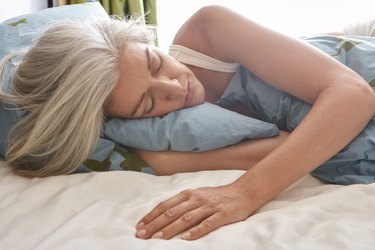
When dreams take on the breakneck speed of a James Bond car chase, they can feel all too real, as can your pounding heart. Is that all in your imagination, or does your heart rate actually go up while you dream? In short, yes, it does — but the real question is, should you be concerned?
Sleep and Your Heart Rate
Video of the Day
According to the UCLA Sleep Disorders Center (UCLA), your heart normally pumps roughly 2,000 gallons of blood every day. And to make that happen, your heart beats an average of about 100,000 times a day. Sleep is a golden opportunity for your heart to catch a much-needed break. In fact, the U.S. Centers for Disease Control and Prevention notes that getting good sleep and a sufficient amount of sleep are critical for maintaining good cardiovascular health.
Video of the Day
That doesn't mean that the heart stops beating, of course. About 80 percent of sleep time is made up of non-rapid-eye-movement (non-REM) sleep, according to UCLA. It's also the first stage of sleep. And, according to Harvard Medical School, that's when both your heart rate and blood pressure drop from what's normal when you're awake.
Drilling down even further, the Mayo Clinic points out that non-REM sleep is itself comprised of three distinct phases: light sleep, intermediate sleep and deep sleep. It's during the deep sleep phase that your heart rate really slows down.
What Happens When You’re Dreaming
According to UCLA, most dreams take place during the rapid-eye-movement (REM) stage of sleep, which makes up about 20 percent of a normal night's sleep. When REM begins, your heart activity starts to change, ultimately leading to variations, including an overall jump, in both blood pressure and heart rate, per Harvard Medical School
"We dream during other stages of sleep, not only in stage REM," explains Sara N. Pasha, MD, an assistant professor of medicine and medical director of the Good Samaritan Sleep Disorder Center at the University of Kentucky in Lexington. "However, we remember dreams that occur during REM sleep better." Why? Because those are the dreams that are "more vivid and dramatic in content," she adds.
Key physiological shifts in respiratory and cardiovascular function occur along with REM sleep, Dr. Pasha says. Both are involuntarily controlled by your sympathetic nervous system.
Essentially, REM sleep "is a much more 'active' stage of sleep," Dr. Pasha points out, "and it is characterized by all the hallmarks of increased sympathetic activity, such as irregular breathing and irregular heart rate." That increase means an uptick in the body's so-called fight-or-flight response, states Harvard Health Publishing.
Your heart rate while dreaming can also be influenced by your state of mind because, when you voyage into the land of sleep, you bring all your mental and physical baggage with you. And that baggage may include anxiety, social distress and even PTSD (post-traumatic stress disorder), according to Stanford Health Care.
Heart rate may also be affected if you're struggling with illness, taking any number of prescription medications or using recreational drugs like cocaine or amphetamines, Stanford Health says.
Your Heart Rate During Nightmares
All these factors can also affect dream content, with the potential to turn a dream into a nightmare — think of nightmares as essentially vivid dreams rooted in fear, terror or high anxiety. Nightmares are more common during the last third of your time asleep, Stanford explains, when REM is more likely to take place.
And when nightmares occur, the result can be an elevated sense of distress as your emotions run particularly high, in turn causing your heart rate to go up as well. According to Stanford, if nightmares are interfering with sleep quality and you find yourself waking with a racing heart, you might try meditation, yoga or other forms of exercise to lower stress while awake and get sleep better at night.
- Sara N. Pasha, MD, assistant professor of medicine, medical director, Good Samaritan Sleep Disorder Center, University of Kentucky, Lexington
- UCLA Sleep Disorders Center: "Heart Disease"
- U.S. Centers for Disease Control and Prevention: "How Does Sleep Affect Your Heart Health?"
- Mayo Clinic: "Mayo Clinic Minute: What Are the Stages of Sleep?"
- Harvard Medical School: "The Characteristics of Sleep"
- Harvard Health Publishing: "Heart Rate Variability: A New Way to Track Well-Being"
- Stanford Health Care: "Nightmares"